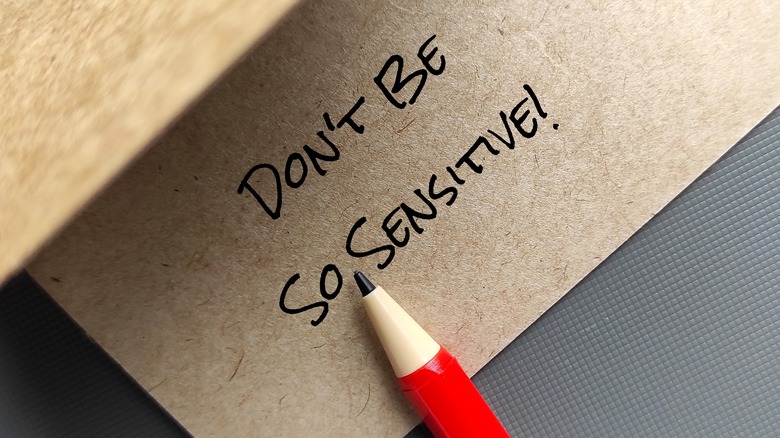Is It Possible To Gaslight Yourself?
You've probably had a friend tell you a story about how their partner did something wrong to hurt them. Before you know it, the blame and responsibility for what happened seem to have landed on your friend. They've quietly accepted that they overreacted and got too emotional about the whole thing and they've decided to let things go and move on. Although to you, those are warning signs their significant other is gaslighting them, to your friend, it's really commonplace behavior that they've never questioned.
The term gaslight originates from "Gas Light" — a 1938 British play — where a husband makes his wife believe that she's seeing things when she communicates to him about dimming gaslights and things going missing in the house (via Britannica). Now brought to awareness by mainstream media, influencers, activists, and psychologists alike, gaslighting is defined as a form of emotional abuse wherein someone uses manipulative words and actions to make the other person question their own reality, according to Very Well Mind. The victim is often left confused about the validity of their own feelings, experiences, and thoughts. While the term is mostly used in the context of romantic relationships, it's entirely possible for someone to gaslight another in a professional, familial, or even friendly setting.
While your friend's scenario is somewhat clearcut to you with an obvious emotional abuser in the narrative, have you ever wondered if it's possible to gaslight yourself?
Yes, it is possible to gaslight yourself
As clinical psychologist Dr. Julie Smith explained, it is entirely possible for you to gaslight yourself (via PureWow); a past experience of being gaslighted by someone else could be to blame. "We can internalize the voice of that abuser so that it becomes the way we speak to ourselves in our own mind," she said. We can also internalize the voices of people or groups in society and let them influence how we see ourselves, reports Well + Good.
There are some key forms of thoughts or ways you speak to yourself that could be helpful indicators, according to Forbes. Gaslighting yourself, also known as "self-gaslighting," can manifest in thoughts like "I can be too sensitive," or "it could be worse." Your internal narrative is self-critical and you're doubtful of whether someone has actually wronged you or not. You then revert back to minimizing your own emotional experience.
Clinical psychologist Ingrid Clayton — writing in Psychology Today — realized she'd been gaslighting herself for most of her life and it all started with her stepfather who invalidated her emotions, emotionally abusing her when she was a child. "I became a psychologist who specialized in trauma, but still couldn't believe or reconcile my own traumatic past," she explained. This self-doubt and inability to recognize we've been gaslighted affects many of us, but we can change that.
How to become aware of and overcome gaslighting yourself
How you'd explore being gaslighted by someone else and how you'd address the situation if you are the one invalidating your own emotions and thoughts require different approaches. Do you have a tendency to blame yourself? Do you value other people's opinions over your own? Do you tell yourself you're being overly sensitive or that you're exaggerating? These might be good questions to think about to help you understand if you're gaslighting yourself, per PureWow. Clinical therapist Brit Barkholtz explains to Huff Post that "minimization and invalidation can show up like minimizing hurt or abuse you've experienced or are experiencing."
Becoming a curious and compassionate observer of your own emotions is a good next step, according to Well + Good. Acknowledging and respecting that you've been gaslighting yourself without judging yourself in the process goes a long way. Seek relationships with people who build you up.
The final step would involve going about correcting your patterns of thought with the help of a therapist or even journaling if you're unable to find proper help, PureWow suggests. Psychologist Katelyn Campbell thinks that therapy is most effective, as trying to navigate it by yourself can become difficult noting that "because of the tendency to discredit yourself — it can feel like you're fighting yourself every step of the way. A therapist can help you safely dig deep to heal your trust in yourself" (via Huff Post).


